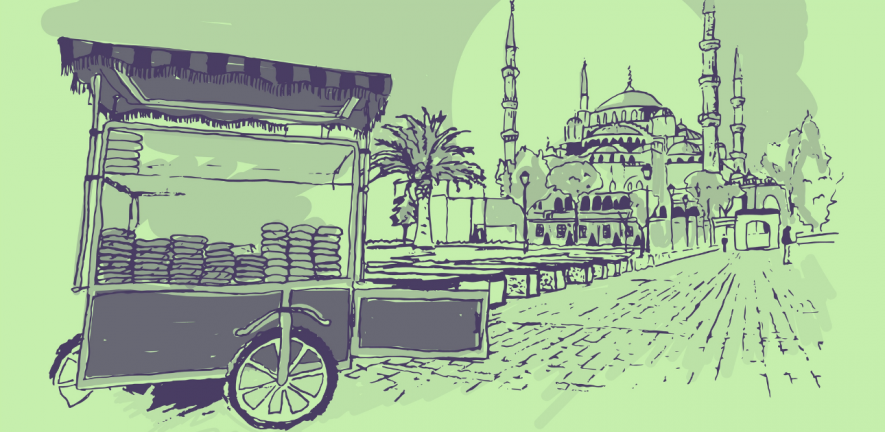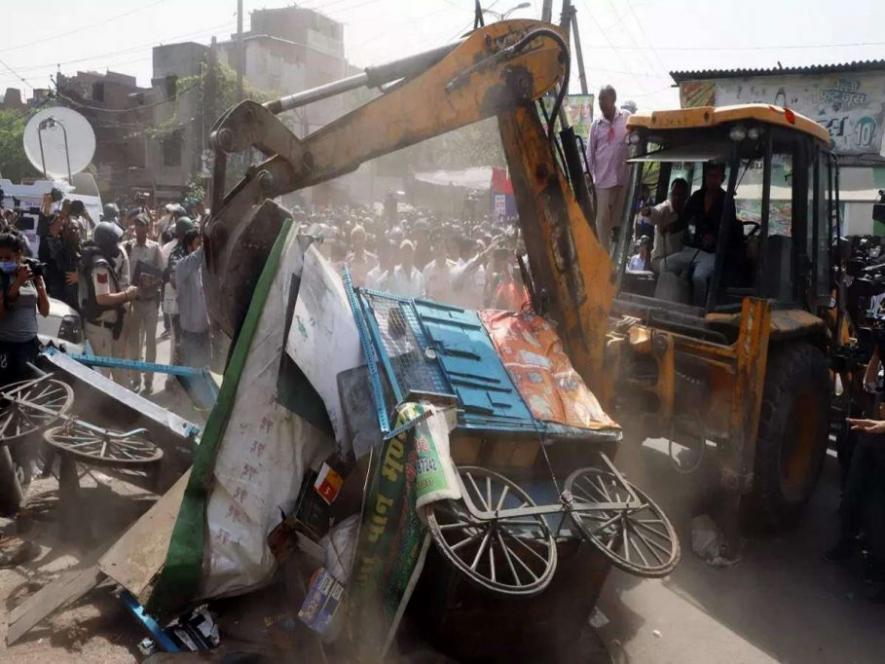How the Jahangirpuri Violence Affected Muslim Street Vendors

While the pandemic and subsequent lockdowns have constrained Muslim street vendors’ economic activities, communal hatred has given rise to cases of assault and discrimination against them.
This is part of our special issue on May Day 2022.
——-
“HUMARA redi hi tod diya, hum bolte reh gaye ki hum samet kar chale jaayenge par haath se redi kheencha aur wahi tod diya (they demolished my vending cart, I kept on saying that I will quickly pack up and go away, but they just pulled the cart and destroyed it),” said Najma Bibi*, a tea seller in Jahangirpuri area in North Delhi, who is now no longer allowed to run her street vending livelihood, her only source of income.
During the demolition drive carried out in Jahangirpuri on April 20, her cart was destroyed to pieces by the local authorities. It was only last year that she was issued a certificate of vending under The Street Vendors (Protection of Livelihood and Regulation of Street Vending) Act, 2014. She reported that she was being called an encroacher even after contributing the last 40 years of her life to the street vending livelihood. “Itne saal lagte hai kaam ko basane me, chalane me, par pal bhar lage inko khatam karne me (It takes years to establish and sustain your livelihood but it took them a few seconds to destroy it)”.
The ‘they’ she kept referring to is the North Delhi Municipal Corporation, the authority in charge of conducting this demolition drive in the Jahangirpuri area.
It has been more than ten days now since the hundreds of Muslim street vendors in Jahangirpuri, including Najma Bibi, have been evicted from their original place of vending, thereby losing their livelihood and daily earnings. The scaling up of violence from verbal assault to bulldozing their carts is due to the communal clash that took place on April 16 in Jahangirpuri.

Vendors are currently in shock after witnessing and experiencing such a ruthless attack. According to them, evictions and displacement are rampant in Delhi, but now are getting fuelled by communal politics. In this process of demolition, along with livelihoods, many lost their houses right before the Supreme Court intervened and ordered a halt on the demolition drive.
“Post eviction and demolition, the vendors did not get any immediate relief and support from the government, and had to rely on the local community and vendors-based associations for relief measures,” said Mohit Valecha, a member of the National Hawker Federation [NHF], an association of street vendors.
“Post eviction and demolition, the vendors did not get any immediate relief and support from the government, and had to rely on the local community and vendors-based associations for relief measures,”
Vendors report that they did not anticipate this, which is why they were unprepared for the evictions, and destruction and seizure of vending carts and goods. “The vendors are feeling hopeless about how they will restore their lives and livelihoods. There are questions threatening their sense of belongingness and existence in the present concerning circumstances. There are multiple apprehensions of what will happen next, and what will be the ‘new normal’ for the street vending livelihood and Muslim community,” said Mohd. Haider, member of the NHF.
Also read: How long will the Indian poor be invisible?
Provisions of Street Vendors Act remain on paper
Street vending is considered to be a vital source of self-employment livelihood for four to five lakh people in Delhi alone. The Street Vendors Act 2014 was enacted to protect and further promote street vendors’ rights in India. It recognizes vendors as an integral part of Indian cities, and grants legal protection to them against forced evictions, confiscation and harassment. It also allows them to participate in executive decision-making in relation to the matters governed by the Act through Town Vending Committees [TVC].
The Act addresses vendors’ requirement of spatial planning as an important urban activity, and recognizes the measures of registration, relocation and other promotional measures like loan assistance and skill upgradation. Unfortunately, despite the national legislation, vendors have been harassed, attacked and evicted by municipal authorities across the country. This disrespected the establishment of statutory TVCs, as the discussion within the TVC has been ruled out completely in municipal decisions relating to vendors.
In the instant case of Jahangirpuri, the vendors did not receive any memo of seizure, which is mandatory under the Act. Most importantly, no legal notice was issued to anyone whose properties were demolished or who were evicted. This all sums up a case of breaching the law, which must alarm all citizens.
Also read: Why the trend of summarily demolishing properties of alleged criminals is patently illegal
In Delhi, this is not new. From time to time, the Act has been violated by the authorities for targeting vendors unlawfully, especially in markets like Chandani Chowk, Lajpat Nagar, Daryaganj, Sarojini Nagar, and Connaught place. However, the case of Jahangirpuri is startling as here, a specific community of vendors has been targeted, bullied, and assaulted on the basis of its religious identity.
Double marginalization faced by Muslim street vendors
The last two consecutive years of the COVID-19 pandemic have adversely affected the economic and political situation of street vendors, especially Muslim vendors in Delhi. On the one hand, where the pandemic and subsequent lockdowns have constrained their economic activities, communal hatred has given rise to cases of assault and discrimination against them, on the other.
Cases from Indore, Ahmedabad, Meerut, Dahrwad and Biswanath Chariali, among many other cities and towns, reflect the rising attacks on Muslim vendors to a level that is concerning and poses a threat to Indian democracy. The incendiary narrative of portraying vendors as encroachers, smugglers and illegal has a correlation with the Islamophobic mindset of the society, which is pushing the community of vendors towards extreme poverty, inequality, and marginalisation.
“The vendors are feeling hopeless about how they will restore their lives and livelihoods. There are questions threatening their sense of belongingness and existence in the present concerning circumstances. There are multiple apprehensions of what will happen next, and what will be the ‘new normal’ for the street vending livelihood and Muslim community.”
Muslim vendors who are integral to Delhi’s economy are now surrounded by grief and trauma that traces back to the past events, and the fear that they have for their future.
Immediate measures that must be taken by the government
Currently, the vendors in Jahangirpuri demand immediate relief efforts from authorities to restore their livelihood through compensation, rehabilitation, and the provision of basic services like ration, water and shelter. Along with this, the process of survey, registration, and issuance of the vending certificates needs to be sped up, along with the demarcation of vending zones and non-vending zones based on the survey conducted in the area last year.
Second, the matter needs to be taken with utmost sincerity, and a thorough investigation is required to provide justice to the Muslim vendors and community of Jahangirpuri. This also includes immediate statutory steps to prohibit actions of assault, humiliation and forced evictions against them.
Despite the Street Vendors (Protection of Livelihood and Regulation of Street Vending) Act, 2014, vendors have been harassed, attacked and evicted by municipal authorities across the country.
Lastly, the Street Vendors Act must be protected, promoted, and implemented to the best of our abilities so that rights-based efforts prevail in shifting the systemic perspective to vendor/worker-led governance.
*Name has been changed to protect their identity
Get the latest reports & analysis with people's perspective on Protests, movements & deep analytical videos, discussions of the current affairs in your Telegram app. Subscribe to NewsClick's Telegram channel & get Real-Time updates on stories, as they get published on our website.
























